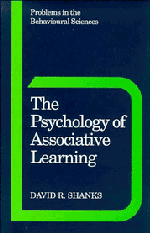Freshly Printed - allow 8 days lead
Couldn't load pickup availability
The Psychology of Associative Learning
A state-of-the-art description of current psychological research in learning and memory.
David R. Shanks (Author)
9780521445153, Cambridge University Press
Hardback, published 28 September 1995
208 pages, 46 b/w illus. 24 tables
23.6 x 15.6 x 1.9 cm, 0.422 kg
"...coherent, engaging, lucid and provocative....replete with lucid summaries of experiments on human and animal learning....expertly coherent account of human associative learning....Shank's book is a lucid and coherent tour of recent in associative learning." John K. Kruschke, Journal of Mathematical Psychology
It is hard to think of any significant aspect of our lives that is not influenced by what we have learned in the past. Of fundamental importance is our ability to learn the ways in which events are related to one another, called associative learning. This book provides a fresh look at associative learning theory and reviews extensively the advances made over the last twenty years. The Psychology of Associative Learning begins by establishing that the human associative learning system is rational in the sense that it accurately represents event relationships. David Shanks goes on to consider the informational basis of learning, in terms of the memorisation of instances, and discusses at length the application of connectionist models to human learning. The book concludes with an evaluation of the role of rule induction in associative learning. This will be essential reading for graduate students and final year undergraduates of psychology.
Preface
1. Introduction
2. The rational analysis of learning
3. Prototype abstraction and instance memorisation
4. Connectionism and learning
5. Rule induction
References
Index.


